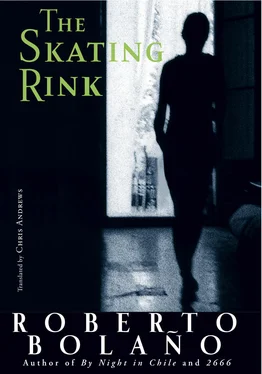Gaspar Heredia:
The police came to the campground twice
The police came to the campground twice, on routine visits, and both times the Peruvian, Miriam from Senegal, Caridad and I pretended to be campers playing pétanque. For such occasions the Peruvian kept various sets of boules in a dog kennel beside the court, and he’d whip around on his bike, if necessary, past the bathrooms and my tent, urgently inviting us to come play. As time went by, we got to like pétanque, and took to playing in the evenings as the sun went down. Our games grew longer and more impassioned. The Peruvian, the receptionist and Miriam made up the day-shift team; while El Carajillo, Caridad and I represented the night-shift. Each team had its pointers, placers or precision players (we never knew what the official term was) and its shooters, knockers or blasters. We usually played under a light, just as it was starting to get dark, sometimes on the road that led into the campground rather than on the courts, or beside the bar, or next to the bathrooms if Miriam still had some cleaning to do. Caridad soon proved to be an outstanding shooter, as did Miriam, while El Carajillo and the Peruvian were born pointers. The receptionist and I just made up the numbers. Alex Bobadilla occasionally replaced the receptionist, with more enthusiasm than skill. In the end we decided to make a selection from our teams and participate in the championship that was held in the campground each year to cap off the season. El Carajillo, the Peruvian and Miriam were selected. The rest of us, including the other two cleaning ladies, who were too busy to play because of their various jobs, were happy to applaud, criticize and drink beer. Around that time, the Peruvian and the receptionist set a date for their wedding, and there was a feeling of confidence and calm in the air, as if everything was going to work out in the end, though everyone knows that nothing ever does. Our team came in third. We won a cup, which Bobadilla and El Carajillo displayed prominently on a shelf in reception. The weather started getting cooler and I began to anticipate the day when my job would come to an end. To be honest I had absolutely no idea what would happen then. Caridad said that living at the campground was like being on vacation. Indefinitely. For me it was like being back at school: I was starting from scratch. We called the tent our house, as a joke I guess, or just to be cute, or maybe because it really was our house. In the morning, when I finished work, we went down to the beach, hopping over the broken slabs of the sidewalk, Caridad still half asleep, both of us wrapped in towels because it was still cool, and then we’d swim and eat and lie in the sun till we fell asleep. We’d wake up at two or three and go back to the campground. The color soon returned to Caridad’s cheeks. All the staff, even Rosa and Azucena, grew fond of her, despite their initial misgivings, maybe because she was always ready to give them a hand, cleaning the bathrooms or doing various odd jobs, even helping out at reception during the day so that the Peruvian and the receptionist could go and have a cup of coffee. With the first signs of autumn everyone started making plans, except for us. Miriam was going to look for jobs in private homes; the sisters would be returning to El Prat; the Peruvian hoped to find work in an office or a realty agency as soon as his papers were in order, and El Carajillo would spend another winter shut up in the reception office, keeping watch over the empty campground. When they asked us what our plans were, we didn’t know what to say. The plural pronoun embarrassed us. Live in Barcelona, probably, we’d say, throwing each other sidelong glances. Or travel, or go and live in Morocco, or study, or go our separate ways. All we really knew was that we were hanging in a void. But we weren’t afraid. Sometimes at night, as I walked through the darker parts of the campground, among empty sites and family-size tents strewn with pine needles, I thought of the skating rink and then I was afraid. Afraid that I might come across something from the rink, snagged, hidden in the darkness. Sometimes the air and the rats scuttling along the branches of the trees almost made that presence visible, and without breaking into a run I’d quickly retrace my steps; I had to hear Caridad’s steady breathing on the other side of the yellow tarpaulin that protected our tent before I could calm down and continue on my rounds. .
Enric Rosquelles:
Apart from my mother and a few aunts and cousins
Apart from my mother and a few aunts and cousins with an exemplary sense of solidarity and familial duty, my only visitors have been Lola and Nuria (who also have an exemplary sense of friendship and solidarity), but their presence meant more to me than a crowd of others. The first to come was Lola, and I was so surprised and overjoyed to see her that I burst into tears in the visiting room. Our misunderstandings, conflicts and professional disagreements were forgotten. As soon as I saw her, I knew: it didn’t matter to her that I was a pariah; a true social worker will always be wherever there is suffering, and there’s no doubt about it, Lola is a social worker through and through. The only member of my numerous team who never sucked up to me (I won’t deny that I occasionally criticized her in public, and she infuriated me, and I considered confining her to a desk job); the only one who dared to visit me when I was in disgrace. That’s the way it is, and it’s not too late for me to learn my lesson: beware the acquiescent, for they will betray you in the end. I must remember that when I’m released. Because I will be released, don’t you worry. But getting back to Lola, she came to see me, as cheerful and energetic as ever, and when I had dried my tears, she said she knew I couldn’t have killed the old woman (who, as it happened, was one of her — one of our — clients), and the truth, she was sure, would come out in the end. Things in Z were terrible: the Social Services Departmewnt was being run by some bootlicker from Fairs and Festivals, who to make things worse was trying to make an impression (though on whom remained a mystery) by reorganizing, that is screwing up, my old client services system, as a result of which many of the staff were seriously considering a career move. Some could already sense that Pilar was going to be defeated in the next election, and others resented having been passed over in the restructuring. I suspect that Lola was in the second group, because she also told me that she would soon be moving to a position in the municipality of Gerona, where she would be earning more and would have full control, so they assured her, over her own programs. I felt that the bit about full control was a kind of veiled reproach, since most of our quarrels had begun over programs designed by Lola, which I then changed, adjusted, corrected or simply tossed into the trash, but since her visit I’m willing to accept any kind of reproach from her, veiled or not. Indeed, I’ll say it once and for all, Lola was the best of my colleagues, and if, in the wake of my dismissal, she leaves too, I can only fear for the homeless, the kids with problems, and all the people at risk in Z. Of course I wished her the best of luck in her new job and we even joked about what I would do, professionally, when I got out of this hole. The rest of the conversation revolved around my current situation and the hodgepodge of legal and illegal concepts that were being applied to it. A few days later Nuria appeared, and her visit, which I had so often imagined, desired, anticipated and feared, illuminated this wretched cave even more powerfully than Lola’s calm friendship. We didn’t talk much, both of us were hoarse, but we said what we needed to say to one another. Nuria was much thinner. She was wearing men’s clothes, trousers and a black jacket, which hung about her loosely, as if they had belonged to her father. Her eyes were red, which made me think she had been crying before she came. I asked her how she was. Lonely, she said. I spend my nights crying and thinking. Pretty much like me. As she was leaving I noticed that she was wearing men’s shoes too: big black shoes, with hard soles and metal plates reinforcing the heels, like skinhead boots. Both Lola and Nuria brought me gifts. Lola’s gift was a novel by Remo Morán. Nuria’s was the supreme skating book, Saint Lydwina or the Subtlety of Ice , by Henri Lefebvre, in French, published by Luna Park in Brussels. For prisoners as for invalids in hospital, there’s no better gift than a book. Time is the only thing I have in abundance, although my lawyer assures me I’ll soon be free. The murder charge doesn’t stand up, so the only charge I’ll have to answer is that of embezzlement. To pass the time until the day of my release, I’m reading and trying to reorganize this place a bit. The governor, a career civil servant, who seems slightly confused, perhaps by my presence or by the unfamiliar milieu, has asked me to help him tidy up this pigsty. I’ve told him he can count on me, I’ll help however I can. He is Castilian, single, more or less my age, and I think we understand each other. In a couple of days I wrote up a report on the state of the facility, focusing on sanitation problems and overcrowding, including evaluations, proposals and justifications. A prisoner who works in the library typed it up, and when the governor read it, he congratulated me enthusiastically and suggested that we revise it together, with a view to entering it for a competition organized by the European Prisons Project. It’s not a bad idea. .
Читать дальше












